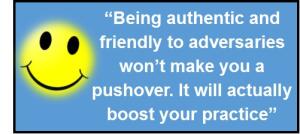Being Nice is Good for Business
 Professional courtesy is not just a nice idea – it can also take your practice to the next level.
Professional courtesy is not just a nice idea – it can also take your practice to the next level.
That might surprise you. You might think the path to success is to be tough and unyielding, to play hardball, to take no prisoners. It’s all about winning, right?
Actually, no. It’s about playing fair and being a good sport – while of course providing vigorous and loyal representation of your client.
Being authentic and friendly to adversaries won’t make you a pushover. It will actually boost your practice.
“[L]awyers who shout, lie and shoot off vulgar emails don’t merely alienate judges and juries, they also slow the wheels of justice and cost clients money,” says this Wall Street Journal article. “Some lawyers say nastiness and aggression results in smaller settlements or can even lose a case, hitting lawyers where it hurts—their wallets. “
And being a jerk also impairs your effectiveness. The WSJ piece – headlined “Lawyers Behaving Badly” – quotes an American Board of Trial Advocates representative as saying when he gets upset he can actually sense his judgment declining as his testosterone rises.
Don’t Take It Personally
“Competition and conflict can co-exist with respect in the legal profession,” writes attorney and professional coach Dena Lefkowitz on her blog.
“You can practice civility while doing battle.”
The trick is not taking it personally, to separate the case from the counsel. Here are some other suggestions from Lefkowitz for cultivating civility in your practice:
- Strive for balance. A life that has a healthy balance of work, family and social obligations will be less stressful. That, in turn, will make you less inclined to be irritable and rude.
- Seek out role models. Look around for lawyers who are class acts. Study them to see how they handle difficult people and situations.
- Pick your battles. Does it really matter whether the deposition is taken at your office or opposing counsel’s? Agree and move on.
- Don’t return fire. You don’t have to respond to every ugly comment or email hurled your way. Ignoring it might be the smart play. If you must respond, do it with courtesy and humor.
- Nurture relationships with opposing counsel. You can’t be friends with everyone, but the more you make a genuine effort to build bridges with your peers, the better off you will be. “These lawyers can become referral sources, references and resources later on,” writes Lefkowitz. “Who has a better idea of what you can do than a lawyer who has seen you in action?”
- Practice compartmentalizing. There is the client, the case and the counsel on the other side. And then there is your sanity and peace of mind. Don’t get these elements confused.
- Meet in person. It’s much easier to be nasty by phone or email.
- Keep your eye on the ball. Your job is to serve your client, not put unpleasant lawyers in their place. Anger encourages risky behavior and makes cases harder to settle. “I tell all the lawyers in my firm, you’re not a fighter, you’re a lover,” says one lawyer in Lefkowitz’s post. “You will get more results with sugar than with vinegar”
N.C. Rules of Professional Conduct
According to the preamble to the North Carolina Rules of Professional Conduct, lawyers should be “guided by personal conscience and the approbation of professional peers.”
Section 13 of the preamble says: “Although a matter is hotly contested by the parties, a lawyer should treat opposing counsel with courtesy and respect. The legal dispute of the client must never become the lawyer’s personal dispute with opposing counsel. A lawyer, moreover, should provide zealous but honorable representation without resorting to unfair or offensive tactics. The legal system provides a civilized mechanism for resolving disputes, but only if the lawyers themselves behave with dignity. A lawyer’s word to another lawyer should be the lawyer’s bond. As professional colleagues, lawyers should … foster civility among members of the bar by acceding to reasonable requests that do not prejudice the interests of the client.”
What are your thoughts on this topic? Is professional civility a big deal or much ado about nothing? Got any horror stories to share?
Sources:
- NC Rules of Professional Conduct http://www.ncbar.com/rules/rules.asp
- Achievement by Design http://achievementbydesign.com/articles/LI/2015-09-17.php
- Wall Street Journal http://www.wsj.com/articles/SB10001424127887323539804578263733099255320
Jay Reeves a/k/a The Risk Man has practiced in North Carolina and South Carolina. Formerly he was Legal Editor at Lawyers Weekly and Risk Manager at Lawyers Mutual. Contact him at jay.reeves@ymail.com.




